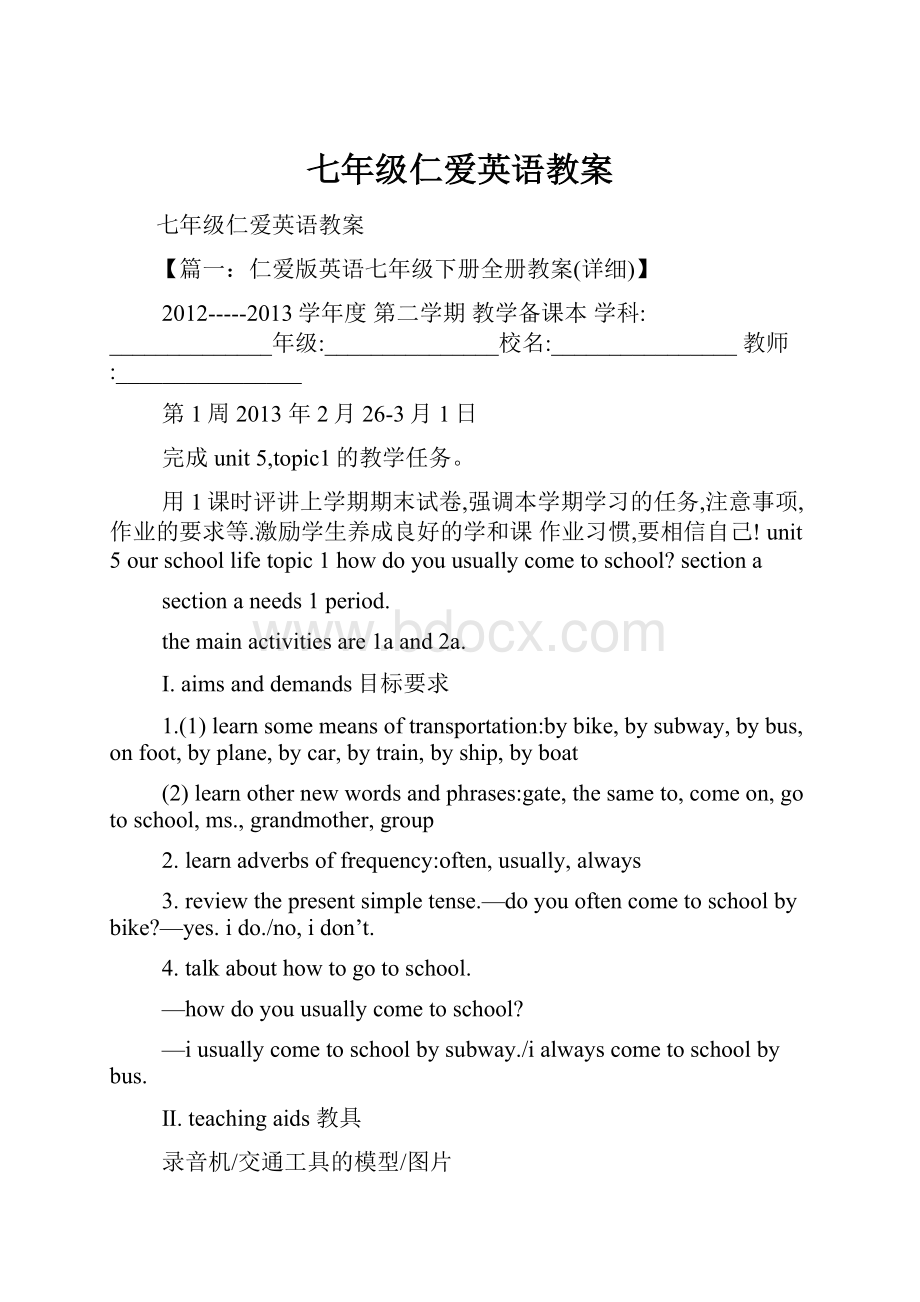七年级仁爱英语教案Word文档格式.docx
《七年级仁爱英语教案Word文档格式.docx》由会员分享,可在线阅读,更多相关《七年级仁爱英语教案Word文档格式.docx(23页珍藏版)》请在冰豆网上搜索。

录音机/交通工具的模型/图片
Ⅲ.five-fingerteachingplan五指教学方案
step1review第一步复习(时间:
5分钟)
复习日常用语并呈现1a内容。
1.(师生互相问好,复习学过的问候语。
)
t:
goodmorning,everyone!
ss:
goodmorning,madam/sir!
welcomebacktoschool,boysandgirls.happynewyear!
教师帮助学生回答。
happynewyear!
wecanalsosay,“thesametoyou!
”
(自然引入“thesametoyou!
”并练习强化。
(
学习1a,完成1b。
1.(用事先准备好的模型、教学图片或简笔画给学生展示bike,由此导入本课重点:
交通方式。
如下图。
2.(用同样的方式教学其他交通工具,并板书相关词组。
(2)(用上面的简笔画和词组,让学生看1b的图片并模仿例句造句:
example:
icometoschoolbybus.
s1:
icometoschoolbybike.
s2:
igotoschoolonfoot.
(完成1b,板书gotoschool。
gotoschool
(3)(询问两名学生上学所使用的交通方式,用usually,always和often作替换练习,并示范汇报结果。
)t:
ioftencometoschoolbybike.doyouoftencometoschoolbybike?
s3:
yes,ido.t:
s4,doyouusuallycometoschoolbybus?
s4:
no,idon’t.iusuallycometoschoolonfoot.
?
good.s3oftencomestoschoolbybike.s4usuallycomestoschoolonfoot.s5alwayscomestoschoolbybus?
ok.workingroupsofthreetopracticelikethat.
2.(
(1)(让学生听1a的录音,回答下列问题。
(t:
yes.
ok,let’sbegin.
(播放录音。
(2)(核对答案,提取重点句型。
whocananswerthefirstquestion?
ican.theymeetattheschoolgate.
welldone.whatabouttheanswertoquestion2?
helenusuallycomestoschoolbysubway.
good.nextquestion?
janealwayscomestoschoolbybus.
goodjob.
(在问题2后板书画线部分并做相应的讲解操练。
(板书)
step3consolidation第三步巩固(时间:
巩固1a,完成1c。
1.(再播放1a的录音,跟读并模仿语音和语调。
listentothetapeandfollowit.payattentiontoyourpronunciationandintonation.
2.(人机对话,即学生和录音机对话,提高学生兴趣。
now,supposeyouarehelenandjane.listentothetape,andmakeadialogwithkangkang.areyouclear?
3.(完成1c,让学生三人一组,练习1a的对话。
要求他们仿照1a与同伴编类似的对话。
now,boysandgirls,pleasepractice1aingroupsofthreeandmakesimilardialogswithyourpartners.theniwillasksomegroupstoactthemout.
4.(选几组表演他们的成果。
whichgroupcanactyourdialogout?
g1:
wecan.(表演对话。
wonderful!
anyoneelse?
g2:
(对学生的表演进行点评,并适当鼓励,必要时纠正学生对话中存在的错误。
step4practice第四步练习(时间:
10分钟)
完成2a和2b。
1.(让学生将2a中与图片相对应的短语代码填入圆圈中。
justnowwetalkedaboutthemeansoftransportation.nowlet’slookatthepicturesin2a.thenmatchthepictureswiththecorrespondingphrases.doyouunderstand?
yes,wedo.
good.let’sbegin!
2.(核对答案。
3.(让学生听录音,完成2b。
掌握生词ms.和grandmother。
next,wewillhavealisteningpractice.let’sfindouthowpeoplecometoschoolorcometowork.doyouunderstand?
(播放录音,并核对答案。
step5project第五步综合探究活动(时间:
15分钟)
用表达交通工具的名词和频度副词进行实践调查,完成3。
1.(使用多媒体课件、flash动画或简笔画,让学生展开想象,任意造句子,要求用上交通工具的表达用语和频度副词。
let’slookatthepictures.i’msureyouareinterestedintheselovelypictures.pleasemakesentencesasyoulike,anddon’tforget
tousethesemeansoftransportationandadverbsoffrequency.areyouready?
go!
2.(让学生分组做一个关于howtocometoschool的调查报告并完成3。
调查时,强调用“howdoyouusuallycometoschool?
”和“iusuallycometoschool?
”句型,掌握生词group。
pleasereportyourresultstoyourclassmates.
inourgroup,threestudentscometoschoolbybike?
inourgroup?
(学习汇总完成3。
3.(家庭作业。
(1)(让学生到社会上做调查,看人们都使用哪些交通工具,哪种交通工具使用多,哪种交通工具使用少,为什么?
并根据自己的调查结果模仿3做一个表格。
(2)(预习sectionb,注意其中的频度副词。
Ⅳ.疑点探究
本课我们学习了介词by表示“用,靠;
通过,借助于(方式、手段)”时的用法。
如:
bycar,byplane,byship等。
用来表示交通方式的介词还有in和on。
inacar,onabus等。
此时交通工具前要加限定词。
但onfoot意为“步行;
走”。
foot前不需任何限定词,foot也不能用复数。
(建议:
教师可在总结课上或练习课上补充。
sectionb
sectionbneeds1period.sectionb需用1课时。
themainactivitiesare1aand2a.本课重点活动是1a和2a。
Ⅰ.aimsanddemands目标要求
1.learnsomenewwordsandphrases:
weekday,early,bird,catch,walk,ride,park,do(one’s)homework,watchtv,television
2.
(1)goonlearningadverbsoffrequency:
seldom,never,sometimes
(2)reviewthepresentsimpletense.
ialwaysgetupataboutsixo’clock.
lixiangoftencomestoschoolbybike.
3.goonlearningadverbsoffrequencyandmeansoftransportationindifferentexpressions.
(1)iseldomwalktoschool.
inevergotoschoolbysubway.
(2)—howdoesmariagohome?
—shesometimesgoeshomebysubway./shesometimestakesthesubwayhome.
4.encouragethestudentstobediligent.
theearlybirdcatchestheworm.
录音机/图片
8分钟)
用链式发问的形式复习交通方式的表达用语及相关句型导出1a,呈现并学习1b。
1.(链式发问。
每竖排第一个学生问其后第二个学生一个有关交通方式的问题,第二个学生回答并接着问第三个学生?
?
以此类推。
每组2分钟时间。
问题是:
howdoyouusuallygotoschool?
/doyouoftengotoschoolbybus/car?
example:
howdoyouusuallygotoschool?
iusuallygotoschoolbybike.howdoyouusuallygotoschool?
iusuallygotoschoolbybus.doyouoftengotoschoolbycar?
s4:
yes,ido./no,idon’t.
2.(根据第1环节的实际情况,老师总结并导出对话1a的语言功能目标,为下一步过渡做铺垫。
good.nowiknowsomeofyoucometoschoolbybike,andsomecometoschoolbybus?
ioftencometoschoolonfoot.butsometimesicometoschoolbybike.inevercometoschoolbybus.butmyfatheralwaysgoestoworkbysubway.heseldomgoestoworkbytrain.
3.(板书并讲解以下频度副词。
step2presentation第二步呈现(时间:
5
分钟)
呈现1a。
1.(通过了解学生的起床时间,引出谚语theearlybirdcatchestheworm。
让学生猜测这句谚语的意思。
ok,boysandgirls,whattimedoyouusuallygetup?
iusuallygetupathalfpastsix.
t:
yes,weshouldgotobedearlyandgetupearly.asthesayinggoes,“theearlybirdcatchestheworm.”whoknowsthemeaningofthissentence?
(让学生猜测,教师板书并加以讲解,并教导学生们在学习和生活中都应该勤奋、努力。
2.(根据1a的主要信息,设置听力任务,让学生带着任务听1a的录音,可以提高兴趣、降低难度。
listento1aandfindouttheanswerstothesequestionsontheblackboard.
(keystothequestions)
(1)hegetsupataboutsixo’clock.
(2)heusuallygoestoschoolonfoot.
(3)no,shedoesn’t.
(4)sallyalwaystakesabustoschool.
巩固1a和1b的内容。
1.(放1a的录音,让学生跟读并模仿语音和语调)
followthetapeandpayattentiontoyourpronunciationandintonation.ready?
2.(人机对话,提高学生的兴趣。
ok.supposeyouaremichaelandsally.listentothetapeandmakeadialogwithhelen.
3.(让学生分角色表演1a,小组之间进行比赛)
good!
nowlet’sworkingroupsandactout1a.thenwe’llchoosethebestone.
呈现2a的图片,呈现同义替换,完成2b和3。
1.
(1)(呈现2a的图片,通过师生互动,让学生进一步了解和巩固语言知识。
lookatthefirstpicture.howdoesmariagohome?
shegoeshomebysubway.
yes,wecanalsosay:
shetakesthesubwayhome.
(同样的,通过谈论第2、3、4幅图,可以得到以下几个句子。
lixiangcomestoschoolbybike./lixiangridesabiketoschool.
wegototheparkonfoot./wewalktothepark.
theygotothezoobybus./theytakeabustothezoo.
(呈现同义替换,加强对交通工具表达方式的灵活运用。
总结并板书。
bysubway—takethesubwaybybike—rideabike
onfoot—walkbybus—takeabus
bycar—takeacarbyplane—fly
(2)(让学生听2a录音并跟读)
followthetapeandpayattentiontothepronunciation.
(3)(引导学生归纳总结1a和2a中频度副词的用法,并进行操练。
findoutthesentenceswiththeadverbsoffrequency,payattentiontotheirusageandthenmakesentences.
2.(让学生完成2b。
now,talkaboutthepicturesin2awithyourpartner.
howdoesmariagohome?
shesometimesgoeshomebysubway./shesometimestakesthesubwayhome.
3.(播放3的录音,让学生独立完成3并核对答案。
step5project第五步综合探究活动
1.(利用所学频度副词进行实践活动。
(1)(让学生用howoftendoyou?
的句型,调查自己的同伴或邻近的学生,根据调查结果,写一段话,尽量使用频度副词。
now,lookatthetable.pleasesurveyyourpartnersoryourneighborsusing“howoftendoyou?
”youshouldcompletethetablewithadverbsoffrequency.atlast,writeashortpassageaccordingtotheform.youcanbeginlikethis:
limingsometimesgoesshopping?
【篇二:
2015年秋仁爱版英语七年级上册教学案unit1】
unit1makingnewfriends
topic1sectiona
一.学习目标
1.学习字母aa~gg的读音和写法
2.学习一些简单的英语交际语言:
二.学习重点:
字母aa~gg
三.学习难点:
单词和问候语
四.学习过程:
(一)导入(时间:
(1.学习英语的重要性。
2.学习英语的正确方法。
目的:
激发学生
学英语的兴趣,提高学习效率。
(二)自学指导
一1.学习字母aa~gg。
2.每个英文字母都有印刷体和书写体,每个字母都有大写小写之分。
字母的书写,要严格要求学生用四线格写,按笔顺和规格书写。
3.看课文会跟读课文中出现的交际用语
二.告诉学生单词是由字母组成的,而句子是由单词组成的。
你们知道在英语中问候别人时应该如何去说吗?
(三)问题导学
()1.英语字母共有个a.28b.26
()2.在英语书写中应用________a手写体b印刷体()3.大写字母d的第一笔是________a竖b半圆
()4.大写字母e的第一笔是_________a横b竖横-
()5.大写字母f的第一笔是_________a横b竖
一.听并选出你所听到的字母
aabbccddeeffgg
二.(两人一组上讲台表演,进行小组竞赛,学习1a和3a。
goodmorning!
________________
i’m...areyou...?
___________________
nicetomeetyou.
_____________________________
welcometochina!
__________________________
(四)典题训练?
一按顺序默写所学字母。
-------------------------------------------------------------------------------------------------------------------------------------------------------------------------------------------